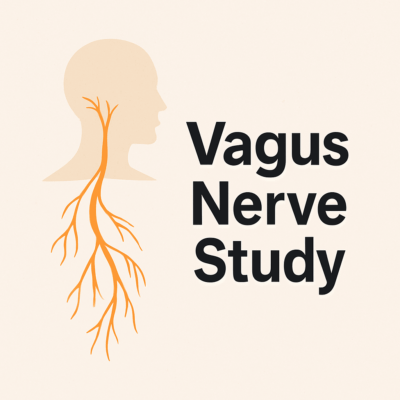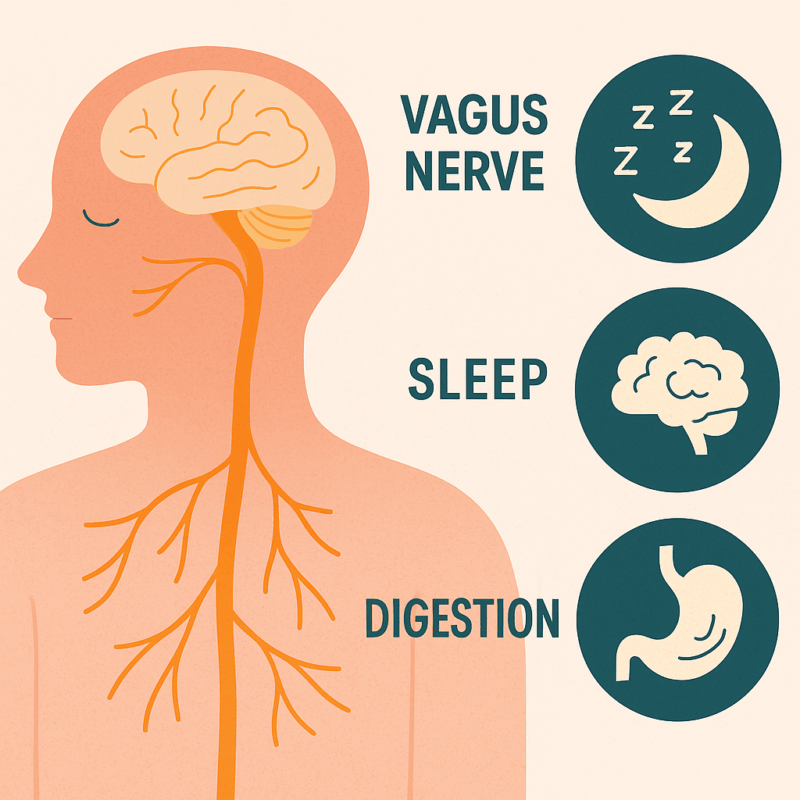
Vagus Nerve and PEMF – The Science Behind
The vagus nerve, often referred to as the “superhighway” of the parasympathetic nervous system, plays a vital role…

Stress, Sleep, and Digestion When you feel stressed, your sleep suffers. When you don’t sleep well, your digestion is affected. And when your digestion is off, stress often increases. These three areas are deeply linked — and the common thread is the VN. What is the Vagus Nerve (VN)? The VN is the longest cranial […]
Table of Contents
When you feel stressed, your sleep suffers. When you don’t sleep well, your digestion is affected. And when your digestion is off, stress often increases. These three areas are deeply linked — and the common thread is the VN.
The VN is the longest cranial nerve in your body. Running from the brainstem down through the chest and into the abdomen, it connects the brain with major organs like the heart, lungs, and digestive system.
It’s a key part of the parasympathetic nervous system — the system that helps you rest, recover, and digest.
Think of the VN as your body’s communication superhighway: when it functions well, signals between the brain and body stay balanced. When it doesn’t, stress, poor sleep, and digestive discomfort can spiral out of control.
Chronic stress activates the “fight-or-flight” response, keeping cortisol levels high and the body on alert. Over time, this weakens vagal tone (the nerve’s ability to regulate).
Poor vagal function means your body has a harder time calming down, which can make stress feel overwhelming.
Healthy vagal activity is linked to deeper, restorative sleep. When the VN is stimulated, heart rate slows, breathing deepens, and the body enters a state more conducive to quality rest.
Low vagal activity, on the other hand, often shows up as trouble falling asleep or staying asleep.
The VN plays a central role in moving food through the digestive tract and regulating enzyme production. When vagal function is low, digestion can slow down, leading to bloating, discomfort, or irregular bowel movements. A healthy vagus response supports smoother digestion, better nutrient absorption, and a calmer gut-brain connection.
The good news is that vagal tone can be strengthened naturally. Some proven ways include:
Deep breathing – slow, diaphragmatic breathing stimulates vagal activity.
Cold exposure – even splashing your face with cold water can activate the VN.
Mindfulness & meditation – help regulate stress and improve heart-rate variability.
Gentle exercise & yoga – movement that encourages relaxation supports vagal health.
Sound & humming – vibrations from chanting, singing, or humming engage vagal pathways.
In addition to lifestyle techniques, modern technologies such as Pulsed Electromagnetic Field (PEMF) therapy show promising effects on VN activity. By gently stimulating the nerve, PEMF may enhance its regulatory role throughout the body.
Here’s how PEMF can help by supporting VN function:
Encourages balance in the autonomic nervous system, shifting the body from stress toward relaxation.
Reduces fight-or-flight activity, promoting a calmer state of mind.
Supports better heart-rate variability, a key indicator of resilience and health.
Improves sleep quality by helping the body transition into deeper rest states.
Aids digestion by supporting gut motility and the “rest-and-digest” response.
Regulates inflammation through vagal anti-inflammatory pathways.
Boosts emotional stability by calming stress-related overactivity.
Strengthens self-regulation with consistent use over time.
By engaging the VN in this non-invasive way, PEMF therapy offers a holistic path toward improved stress resilience, sleep quality, and digestive health.
Stress, sleep, and digestion are not isolated issues — they are interconnected through the VN. By supporting vagal tone, you create a healthier foundation for relaxation, restorative sleep, and optimal digestion.